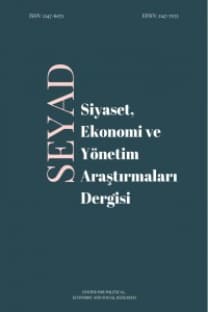A Look at the “Neighbourhood Cooperatives” Concept through the Main Principles of the “Akhy System” to Develop Sustainable Social Structure
.
A Look at the “Neighbourhood Cooperatives” Concept through the Main Principles of the “Akhy System” to Develop Sustainable Social Structure1
Akhism, Cooperative, Neighbourhood, Neighbourhood Cooperatives Sustainabil,
___
- Anderson, Elizabeth S. (2014), “Dewey's Moral Philosophy”, The Stanford Encyclopedia of Philosophy, Editor: Edward N. Zalta, Metaphysics Research Lab, Stanford University, USA, https://plato.stanford.edu/archives/spr2014/entries/dewey-moral/
- Atik, Kayhan (2011), “Ahilik ve Siyaset”, İlahiyat Fakültesi Dergisi, C.2, S.13, s. 57-73.
- Butcher, Bill and Yan Xu (2014), “Chinese Cooperatives and Environmental Social Responsibility”, Chinese Economy, Vol.47, No.4, pp. 63-80.
- Casaburi, Lorenzo and Rocco Macchiavello (2015), “Loyalty, Exit, and Enforcement: Evidence from a Kenya Dairy Cooperative”, American Economic Review, Vol.105, No.5, pp. 286- 90. CTTC (Confederation of
- http://www.tesk.org.tr/tr/yayin/124.pdf, 28.03.2017. Turkish Tradesmen and Craftsmen)
- Demirci Mustafa (2011), “Selçuklu Anadolu’sunda Bir İnsaniyet Mektebi: Ahilik”, Büyük Selçuklu Devletinden Türkiye Selçuklu Devletine: Mehmet Altay Köymen Armağanı, Editör: Mehmet Hacı Gökmen, Selçuk Üniversitesi Türkiyat Araştırmaları Enstitüsü Yayınları:5, Konya, ss. 121-136.
- Durak, İbrahim and Attila Yücel (2010), “Socio-Economics Effects of Akhism and Reflections until Nowadays”, Suleyman Demirel University, the Journal of Faculty of Economics and Administrative Sciences, Volume: 15, No: 2, pp. 151-168.
- ESBF, (Earth Summit 2002 Briefing Paper), http://www.earthsummit2002.org/Es2002.pdf, 15.03.2017.
- EtimolojiTürkçe, “Kooperatif”
- https://www.etimolojiturkce.com/kelime/kooperatif, 10.03.2017.
- Gündüz, Ali Yılmaz, Mehmet Kaya ve Cahit Aydemir (2012), “Ahilik Teşkilatında ve Günümüzde Tüketicilerin Korunmasına Yönelik Çalışmalar Üzerine Bir Değerlendirme”, Afyon Kocatepe Üniversitesi İktisadi ve İdari Bilimler Dergisi, C.4, S.2, ss. 37-54.
- HABITAT, http://habitat.igc.org/vancouver/van-decl.htm, 14.03.2017.
- HABITAT, https://habitat3.org/about, 15.03.2017.
- HABITAT, https://www2.habitat3.org/the-new-urban-agenda 15.03.2017.
- Harun, Mohd Zainal Munshid and Othman Chin (2015), “Examining the Association Between Group Cohesion and Group Performance in the Co-Operative Movement”, International Journal of Business and Industrial Marketing, Vol.1, No.2, pp. 26-30.
- Harun, Mohd Zainal Munshid and Rosli Bin Mahmood, R. (2012), “The Relationship Between Group Cohesiveness and Performance: An Empirical Study of Cooperatives Movement in Malaysia”, International Journal of Cooperative Studies, Vol.1, No.1, pp. 15-20. HIS, (Hoosier Independent Stationers), http://www.independentstationers.coop/Home/About-Us/Importance-of- Cooperatives 12.04.2017.
- https://quran.com/3, 14.04.2017.
- ICA, (International Cooperative Alliance), http://ica.coop/en/facts-and-figures 12.04.2017.
- Ifenkwe, G.E. (2012), “Analysis of Pull and Push Factors in Cooperative Business Organization in Abia State, Nigeria”, International Journal of Cooperative Studies, Vol.1, No.1, pp. 21-24. ILO
- (International Labour Organisation)
- http://www.ilo.org/dyn/normlex/en/f?p=NORMLEXPUB:12100:0::NO::P12100_IL
- O_CODE:R193, 27.03.2017.
- Internet Encyclopedia of Philosophy, “John Dewey”, http://www.iep.utm.edu/dewey/, 14.04.2017.
- Kanlı, İmam Bakır (2016), “Sürdürülebilir Gelişmeyi Sağlamada Startejik Bir Araç: Mahalle Kooperatifleri”, Çağdaş Yerel Yönetimler, C.25, S.3, ss. 1-34.
- Karaca, Hatice (2015), “Ana Kaynaklarıyla Türk Ahiliği Üzerine”, Ahi Evran Üniversitesi Sosyal Bilimler Enstitüsü Dergisi, C.2, S.1, s. 91-92.
- Kayadibi, Fahri (2000), “Anadolu Selçuklular Döneminde Ahi Teşkilatinda Eğitim”, İstanbul Üniversitesi Sosyoloji Konferansları Dergisi, S.26, s. 177-188.
- Kılınç, Murat (2010). “Ahiler ve Ahilik Kültürü” http://img.eba.gov.tr/576/25f/614/d96/bac/524/276/bca/d12/3b0/afc/247/af2/918 /005/57625f614d96bac524276bcad123b0afc247af2918005.pdf?name=AHİLİK.pdf, 04.04.2017. Mazak, Ali (2017)
- http://www.tasavvufkitapligi.com/i/uploads/298427ahilikte-moral
- degerler.pdf, 04.04.2017.
- Mori, Pier Angelo (2014), “Community and Cooperation: The Evolution of Cooperatives towards New Models of Citizens' Democratic Participation in Public Services Provision”, Annals of Public and Cooperative Economics, Vol.85, No.3, pp. 327-352.
- Özdemir, G., G. Keskin ve H. Özüdoğru (2011), “Türkiye’de Ekonomik Krizler ve Tarımsal Kooperatiflerin Önemi”, Tekirdağ Ziraat Fakültesi Dergisi, C.8, S.1, ss. 101-113.
- Özerkmen, Necmettin (2004), “Ahi̇liğin Tari̇hsel – Toplumsal Temelleri̇ ve Temel Toplumsal Fonksi̇yonları – Sosyoloji̇k Yaklaşım”, Ankara Üniversitesi Dil ve Tarih-Coğrafya Fakültesi Dergisi, C.44, S.2, s. 57-78.
- Öztürk, Nurettin (2015), “Ahilik Teşkilatı ve Günümüz Ekonomisi, Çalışma Hayatı ve İş Ahlakı Açısından Değerlendirilmesi”, Dumlupınar Üniversitesi Sosyal Bilimler Dergisi, S.7, ss. 1-12.
- Picciotti, Antonio, Andrea Bernardoni, Massimo Cossignani, and Luca Ferrucci (2014), “Social Cooperatives in Italy: Economic Antecedents and Regional Distribution”, Annals of Public and Cooperative Economics, Vol.85, No.2, pp. 213-231.
- Segu’i-Mas, Elies, Helena-Maria Bollas-Araya and Fernando Polo-Garrido (2015), “Sustainability Assurance on the Biggest Cooperatives of the World: An Analysis of their Adoption and Quality”, Annals of Public and Cooperative Economics, Vol.86, No.2, pp. 363-383.
- Temel, Hilal (2007), Ahilik Teşkilatının Halkın Eğitim ve Öğretimindeki Rolü, Yayımlanmamış Yüksek Lisans Tezi, T.C. Selçuk Üniversitesi Sosyal Bilimler Enstitüsü, Konya.
- UACT (Union of Agricultural Chambers of Turkey) http://www.tzob.org.tr/Bas%C4%B1n- Odas%C4%B1/Haberler/ArtMID/470/ArticleID/1297/S252rd252r252lebilir- kalk%C4%B1nman%C4%B1n-yolu-kooperatiflerden-ge231iyor, 10.03.2017.
- UN, (United Nations), http://legal.un.org/avl/pdf/ha/dunche/dunche_e.pdf, 14.03.2107. UN, (United Nations), http://nua.unhabitat.org/uploads/DraftOutcomeDocumentofHabitatIII_en.pdf 15.03.2017.
- UN, (United Nations), http://www.un.org/esa/earthsummit/coverage.html, 14.03.2017. UN, (United 14.03.2017. http://www.un.org/events/wssd/summaries/envdevj1.htm
- UN, (United Nations), http://www.un.org/sustainabledevelopment/cities/, 15.03.2017.
- UN, (United Nations), http://www.un.org/sustainabledevelopment/cities/ 15.03.2017.
- UN, (United Nations), http://www.un.org/sustainabledevelopment/hunger/, 15.03.2017. UN, (United Nations)
- http://www.un.org/sustainabledevelopment/sustainable
- development-goals/, 15.03.2017. UN, (United Nations)
- http://www.un.org/sustainabledevelopment/sustainable
- development-goals/ 10.03.2017.
- UN, (United Nations), https://sustainabledevelopment.un.org/post2015/summit 10.03.2017.
- UN, (United Nations), https://sustainabledevelopment.un.org/rio20 15.03.2017
- UN, (United Nations), www.un.org, 14.03.2107.
- UN, (United Nations), www.un.org/geninfo/bp/enviro.html, 14.03.2017.
- Verhees, Fr. J. H. M. , Sergaki, P. ve Van Dijk, G. (2015), “Building Up Active Membership in Cooperatives”, New Medit: Mediterranean Journal of Economics, Agriculture and Environment, Vol.14, No.1, s. 42-52.
- WCED, (World Commission on Environment and Development), Our Common Future, 1987, http://www.un-documents.net/our-common-future.pdf, 14.03.2017.
- Wood, Kay C., Harlan Smith and Daurice Grossniklaus (2001), “Piaget's Stages of Cognitive Development”, Global Text: Emerging perspectives on learning, teaching, and technology, Editor-In-Chief: Michael Orey, Associate Editor: Marisa Drexel, Retrieved from: content/uploads/2011/07/psych406-5.3.2.pdf
- https://www.saylor.org/site/wp
- Zaimova, Darina, George Zheliazkov and Veneta Gaidardjieva (2012), “Cooperative Movement and Rural Development in Bulgaria: Policy Support and Practical Implementation”, International Journal of Cooperative Studies, Vol.1, No.2, pp. 47-54.
- ISSN: 2147-6071
- Yayın Aralığı: Yılda 2 Sayı
- Başlangıç: 2014
- Yayıncı: Politik Ekonomik ve Sosyal Araştırmalar Merkezi
İlahiyat Öğrencileri Ne Kadar İslami Finans Okuryazarı?
Muhammed Emin DURMUŞ, Fatih YARDIMCIOĞLU
Küreselleşmenin Ekonomik Büyümeye Etkisi: Türkiye Üzerine Ekonometrik Bir Analiz
Mehmet Vahit EREN, İbrahim ÇÜTCÜ
Abdülkadir PEHLİVAN, Murat KARLIKLI
Hayek’in Toplum ve İktisat Anlayışı: Eleştirel Bir Değerlendirme
The Implementation of Integration on Knowledge: Islam-Psychology
Nüfus Hakkında Bazı Yanılgılar
Demokrasi Karbondioksit Emisyonu İçin Önemli mi? Türkiye İçin Bir Uygulama
